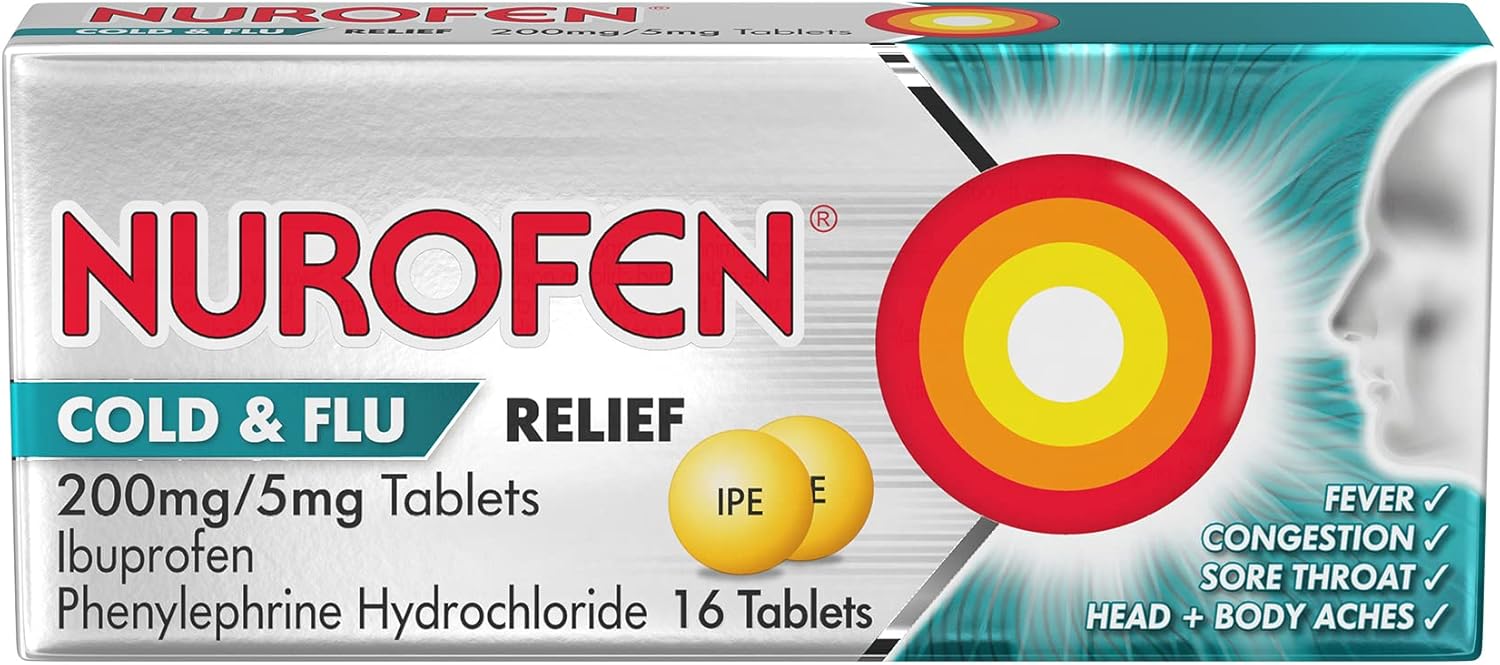About this deal
All medicines have risks and benefits. Your pharmacist or doctor has weighed the risks of you taking NUROFEN® COLD AND FLU against the benefits they expect it will have for you. Other NSAIDs: The use of this product with concomitant NSAIDs, including cyclo-oxygenase-2 selective inhibitors, should be avoided (see section 4.5). But do not take ibuprofen with similar painkillers like aspirin or naproxen without talking to a pharmacist or doctor.
Patients who have previously shown hypersensitivity reactions (e.g. asthma, rhinitis, angioedema or urticaria) in response to ibuprofen, acetylsalicylic acid (aspirin) or other non-steroidal anti-inflammatory drugs (NSAIDs). The pain and fever-reducing ingredients often found in these medicines -- acetaminophen, ibuprofen , naproxen sodium, and aspirin -- are safe for most adults if taken correctly. But in the throes of fever or the flu, you may not think as clearly about safety. When taken by mouth as a nasal decongestant, phenylephrine is usually given at intervals of 4-6 hours.Severe skin reactions such as acute generalized exanthematous pustulosis (AGEP) may occur with ibuprofen and pseudoephedrine-containing products. This acute pustular eruption may occur within the first 2 days of treatment, with fever, and numerous, small, mostly non-follicular pustules arising on a widespread oedematous erythema and mainly localized on the skin folds, trunk, and upper extremities. Patients should be carefully monitored. If signs and symptoms such as pyrexia, erythema, or many small pustules are observed, administration of Nurofen Cold & Flu should be discontinued and appropriate measures taken if needed.
Ibuprofen works faster because its function is local, as we have seen, and its duration is more significant. Paracetamol is not a good anti-inflammatory, and its effect is negligible, but it has fewer side effects and is antipyretic (lowers fever). Systemic lupus erythematosus and mixed connective tissue disease – increased risk of aseptic meningitis (see section 4.8). Cough and cold medicines are often used for symptom relief however it’s important to know there is not enough evidence showing they work well, particularly in children. There are a number of over-the-counter medicines that can help relieve cold and flu symptoms. These include: Paracetamol for pain and fever Clinical trial and epidemiological data suggest that use of ibuprofen (particularly at high doses 2400 mg daily) and in long-term treatment may be associated with a small increased risk of arterial thrombotic events (for example myocardial infarction or stroke), (see section 4.4).
Mixing ibuprofen with herbal remedies and supplements
The therapeutic effect of ibuprofen in symptoms relating to the common cold and influenza has a duration of up to 8 hours.
If you have existing medical problems that may put you at a higher risk of complications from the flu or COVID-19, talk to your doctor to see if antiviral medications are right for you. Try and see your doctor as soon as possible after you start having symptoms. The earlier you start, the more effective the medicine is likely to be.Nuromol Dual Action Pain Relief 200/500mg tablets. Contains ibuprofen & paracetamol. For pain relief not relieved by ibuprofen or paracetamol individually. Some people occasionally can get a bacterial infection as a complication of a cold or flu. This kind of infection is uncommon and most people will get better by themselves without antibiotics. If you are at a high risk of complications, then your doctor may give you antibiotics. Talk to your doctor to see if antibiotics are right for you. diuretics – medicines used to help reduce the amount of excess fluid in the body by increasing the amount of urine produced. From the 20th week of pregnancy onward, ibuprofen use may cause oligohydramnios resulting from foetal renal dysfunction. This may occur shortly after treatment initiation and is usually reversible upon discontinuation. In addition, there have been reports of ductus arteriosus constriction following treatment in the second trimester, most of which resolved after treatment cessation. Therefore, during the first and second trimester of pregnancy, ibuprofen should not be given unless clearly necessary. If Ibuprofen is used by a woman attempting to conceive, or during the first and second trimester of pregnancy, the dose should be kept as low and duration of treatment as short as possible. Antenatal monitoring for oligohydramnios and ductus arteriosus constriction should be considered after exposure to ibuprofen for several days from gestational week 20 onward. Ibuprofen should be discontinued if oligohydramnios or ductus arteriosus constriction are found.
 Great Deal
Great Deal 